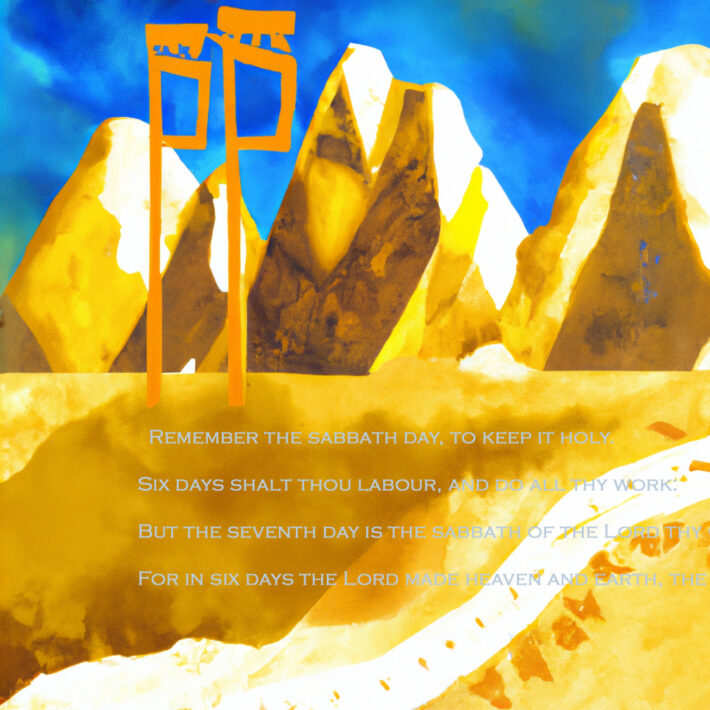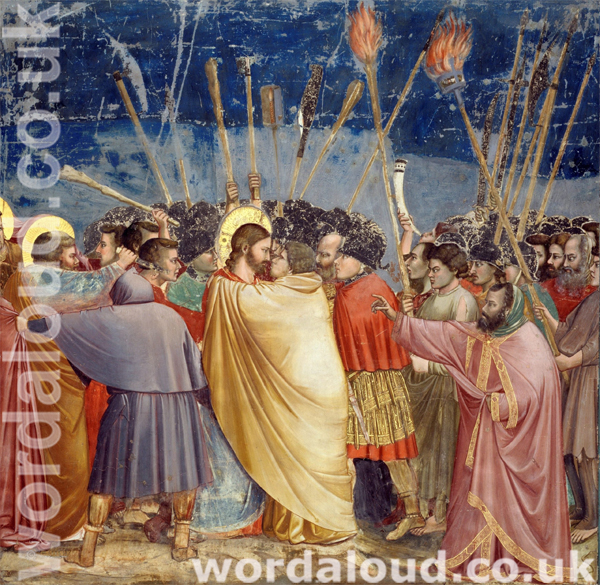The Ten Commandments | The Third Commandment. ‘Keep Holy The Lord’s Day.’ | King James Audio Bible
The third commandment of the Ten Commandments, ‘Keep holy the Lord’s day,’ is a call to set aside time on a regular basis to rest from one’s daily work and to focus on the worship and service of God. This commandment is often understood to refer to the Christian Sabbath, which is traditionally observed on Sunday, the day of the resurrection of Jesus Christ.
According to the Catechism of the Church, ‘The third commandment of the Decalogue recalls the holiness of the Sabbath: ‘The seventh day is a Sabbath of solemn rest, holy to the Lord.’ On Sundays and other holy days of obligation, the faithful are to refrain from engaging in work or activities that hinder the worship owed to God, the joy proper to the Lord’s Day, the performance of the works of mercy, and the appropriate relaxation of mind and body’ (CCC 2184).
In practical terms, this commandment calls on Christians to set aside time on Sunday and other holy days to rest from their daily work and to focus on the worship and service of God. This can include attending Mass or other religious services, spending time in prayer and reflection, and engaging in acts of charity and service to others. It also means refraining from engaging in activities that would distract from or interfere with the worship and service of God, such as unnecessary work or leisure activities.
The third commandment also calls on Christians to recognize the value of rest and to prioritize it in their lives. This can include taking time to relax and recharge, and to spend time with family and loved ones. By observing the Sabbath and keeping it holy, Christians can more fully embrace their faith and demonstrate their commitment to living out the teachings of the gospel.
How Do Jews Celebrate The Sabbath On Saturday?
The Sabbath, or Shabbat in Hebrew, is observed by Jews on the seventh day of the week, which is Saturday. The observance of the Sabbath is rooted in the Biblical account of creation, in which God rested on the seventh day after completing the work of creation. The Sabbath is therefore seen as a day of rest and a day to remember and give thanks for the blessings of creation.
The Sabbath is a time for Jews to focus on spiritual matters and to spend time in prayer and study. Many Jews observe the Sabbath by attending synagogue services, reciting special prayers, and engaging in Torah study. The Sabbath is also a time for Jews to rest from their daily work and to spend time with family and loved ones.
The observance of the Sabbath is a central aspect of Jewish life and identity, and is considered to be one of the most important commandments in the Torah. The Sabbath is seen as a day of holiness and a time to remember and honour God, and is traditionally observed by refraining from work, engaging in worship and spiritual practices, and spending time with loved ones.
What Did Jesus Say About The Sabbath?
In the Gospels, Jesus frequently speaks about the Sabbath and the importance of keeping it holy. As a Jew himself, Jesus was raised observing the Sabbath and other Jewish customs and laws. However, in his teachings and actions, Jesus challenged traditional understandings of the Sabbath and emphasized the importance of focusing on its spiritual aspects rather than on legalistic observance of its laws.
One of the most famous stories about Jesus and the Sabbath is the story of Jesus healing a man with a withered hand on the Sabbath. In this story, which is found in the Gospels of Matthew, Mark, and Luke, Jesus is teaching in the synagogue on the Sabbath when he sees a man with a withered hand. Despite the objections of the religious leaders present, Jesus heals the man, restoring his hand to full function. In this story, Jesus makes it clear that the Sabbath is a day for doing good and for showing compassion to others. He challenges the religious leaders of his time, who were more concerned with upholding the strict observance of the Sabbath laws than with showing compassion to those in need.
Throughout his ministry, Jesus taught that the Sabbath was a day for rest and worship, but that it was also a day for doing good and for showing compassion to others. In the Gospel of Matthew, Jesus says, ‘The Sabbath was made for man, not man for the Sabbath’ (Matthew 12:8). In this statement, Jesus challenges the idea that the Sabbath is an end in itself, and instead affirms the gift and the benefit of the Sabbath to man – to people. The Sabbath is ordained by God in order to ensure that people have sufficient time to access and to be recipient to God. It is an evil in the modern age in Western societies that people are deprived of this right.
In the Gospels, Jesus frequently addressed the topic of the Sabbath and the importance of keeping it holy. Jesus often used the Sabbath as an opportunity to teach and to perform miracles.
Jesus repeatedly challenges the traditional understanding of the Sabbath as a day for strict observance of certain laws and rituals, and instead emphasizes that the Sabbath is a day for the benefit of humanity. He asserts his authority over the Sabbath, and suggests that it is meant to be a day for rest, worship, and the doing of good deeds.
In the Gospel of Mark: ‘And he [Jesus] said to them, ‘The Sabbath was made for man, not man for the Sabbath. So the Son of Man is lord even of the Sabbath’‘ (Mark 2:27-28).
In the Gospel of Luke: ‘And he [Jesus] said to them, ‘The Sabbath was made for man, not man for the Sabbath. Therefore the Son of Man is lord even of the Sabbath’‘ (Luke 6:5).
In the Gospel of John, Jesus says: ‘The Sabbath was made for man, not man for the Sabbath’ (John 9:14).
Jesus’ Ministry And The Commandment Of The Sabbath
Jesus’ teachings and actions on the Sabbath demonstrate his commitment to honouring the Sabbath as a special day of rest and worship, and to using it as an opportunity to do good and to show compassion to others. Jesus challenges the idea of legalistic observance of the Sabbath laws, and instead emphasizes the importance of focusing on the spiritual aspects of the Sabbath and of using it as a time to rest, to spend time with God, and to serve others.
In the Gospel of Matthew, Jesus says: ‘But if you had known what this means, ‘I desire mercy, and not sacrifice,’ you would not have condemned the guiltless. For the Son of Man is lord of the Sabbath’ (Matthew 12:7-8).
In this passage, Jesus cites the prophet Hosea, and suggests that mercy and compassion are more important than strict adherence to religious laws and rituals.
In the Gospel of Mark, Jesus tells a parable about a man who has a field that produces a bountiful harvest. The man is so overjoyed by the harvest that he decides to pull down his old barns and build new ones to store all of the grain. Jesus says: ‘And I [Jesus] tell you, make friends for yourselves by means of unrighteous wealth, so that when it fails they may receive you into the eternal dwellings’ (Mark 4:18-19).
In this parable, Jesus suggests that the Sabbath is a time to focus on eternal things, rather than on earthly possessions. He encourages his followers to use their wealth and resources to help others and to build relationships, rather than to accumulate wealth for its own sake.
In the Gospel of Luke, Jesus tells a parable about a Pharisee and a tax collector who go to the temple to pray. The Pharisee stands up and prays about all of the good things he has done, while the tax collector stands off to the side and prays: ‘God, be merciful to me, a sinner’ (Luke 18:13).
Jesus says, ‘I tell you, this man [the tax collector] went down to his house justified, rather than the other [the Pharisee]; for everyone who exalts himself will be humbled, but he who humbles himself will be exalted’ (Luke 18:14).
In this parable, Jesus teaches that the Sabbath is a time for humility and self-reflection, rather than for pride and self-righteousness. He encourages his followers to focus on their own sinfulness and to seek God’s mercy, rather than to focus on their own achievements and righteousness.
The Christian Celebration Of The Lord’s Day, Sunday, Recalls Easter
The Christian celebration of the Lord’s Day, Sunday, is a weekly reminder of the resurrection of Jesus Christ on Easter Sunday. According to the Christian tradition, Jesus was crucified on Good Friday, and on the following Sunday, he rose from the dead, fulfilling the prophecies of the Old Testament and establishing himself as the Son of God and the saviour of humanity.
In the New Testament, the apostle Paul writes about the significance of the Lord’s Day for Christians: ‘On the first day of the week, when we were gathered together to break bread, Paul talked with them, intending to depart on the next day, and he prolonged his speech until midnight’ (Acts 20:7). In this passage, Paul refers to the practice of Christians gathering on the first day of the week, which is Sunday, to worship and to participate in the Lord’s Supper.
Throughout the history of the Christian church, Sunday has been observed as the Lord’s Day, a day set aside for worship and for the celebration of the resurrection of Jesus. In the early Christian church, Sunday was seen as a ‘little Easter,’ a weekly celebration of the resurrection of Jesus.
In the Catechism of the Church, it states: ‘Sunday is the day on which the paschal mystery is celebrated in light of the apostolic tradition and is to be observed as the foremost holy day of obligation in the universal Church’ (Catechism of the Catholic Church, 2174). This passage emphasizes the centrality of the resurrection of Jesus in the Christian faith, and the importance of observing Sunday as a special day of worship and celebration.
Overall, the Christian celebration of the Lord’s Day on Sunday serves as a weekly reminder of the resurrection of Jesus on Easter Sunday, and as an opportunity to participate in the paschal mystery of the death and resurrection of Jesus. It is a time to worship, to celebrate, and to give thanks for the salvation that Jesus has won for humanity through his death and resurrection.
While Christians do not observe the Jewish Sabbath on Saturday, many believe that they honour the Sabbath by observing Sunday as the Lord’s Day and by participating in worship and the sacraments.








